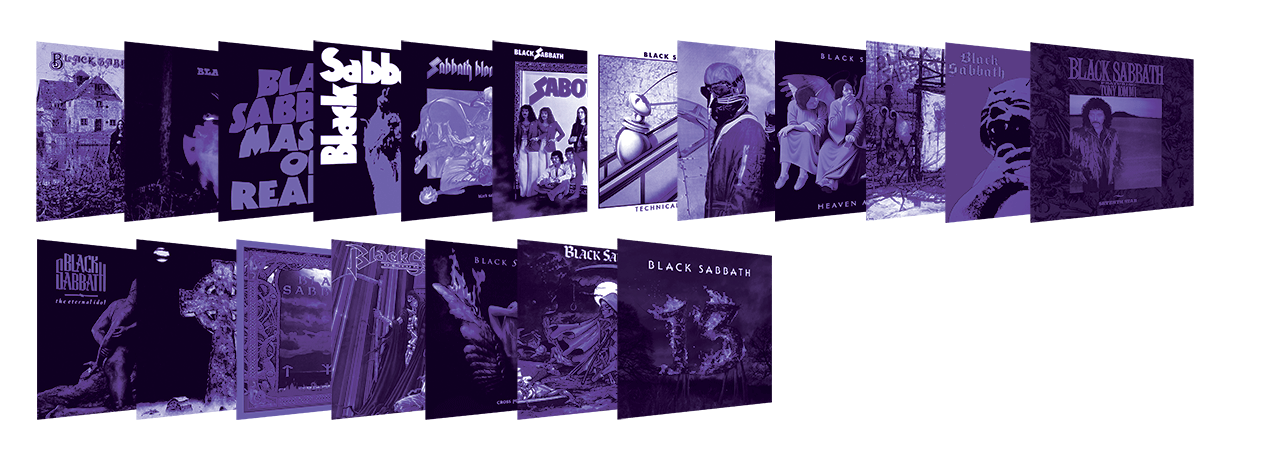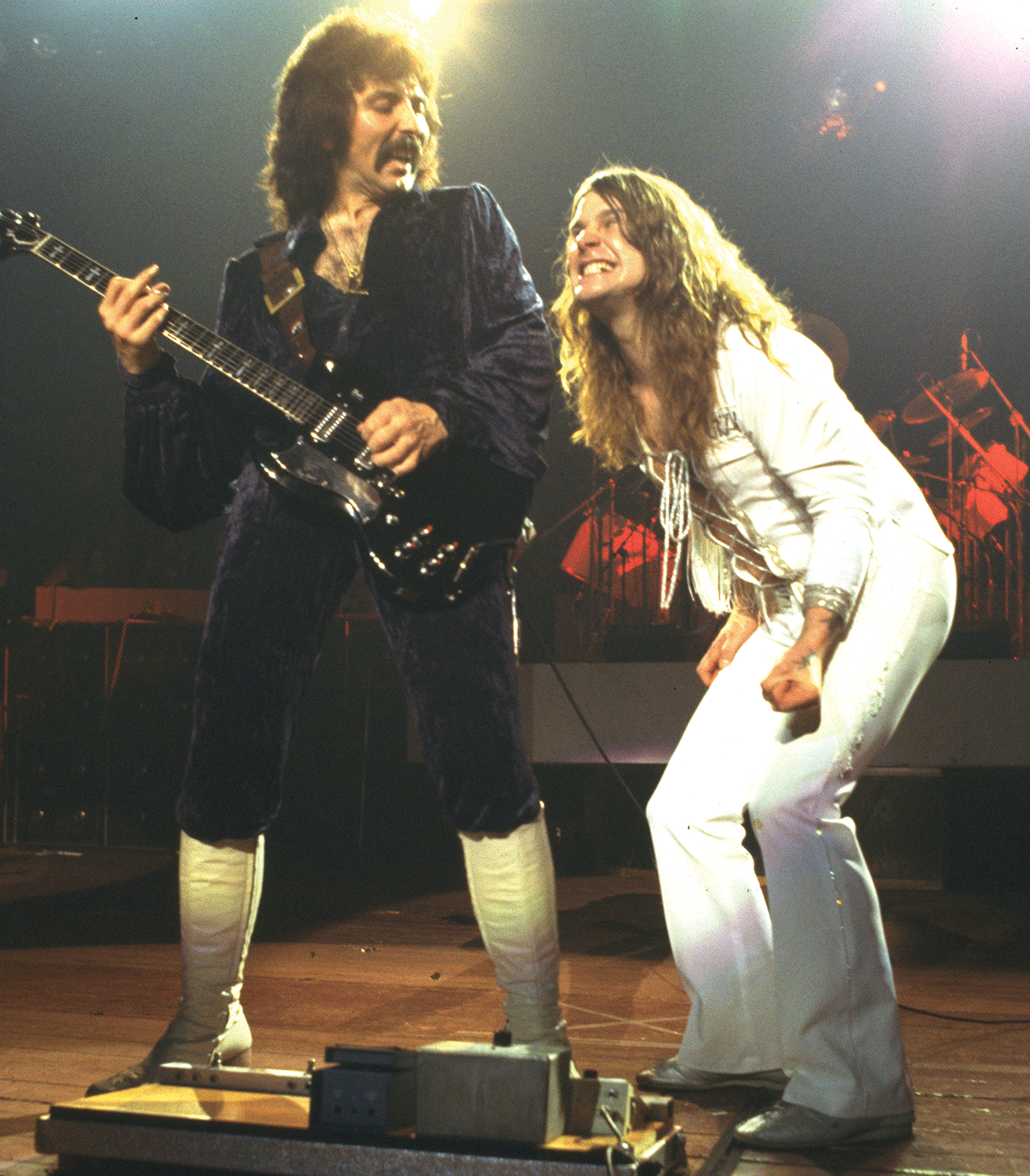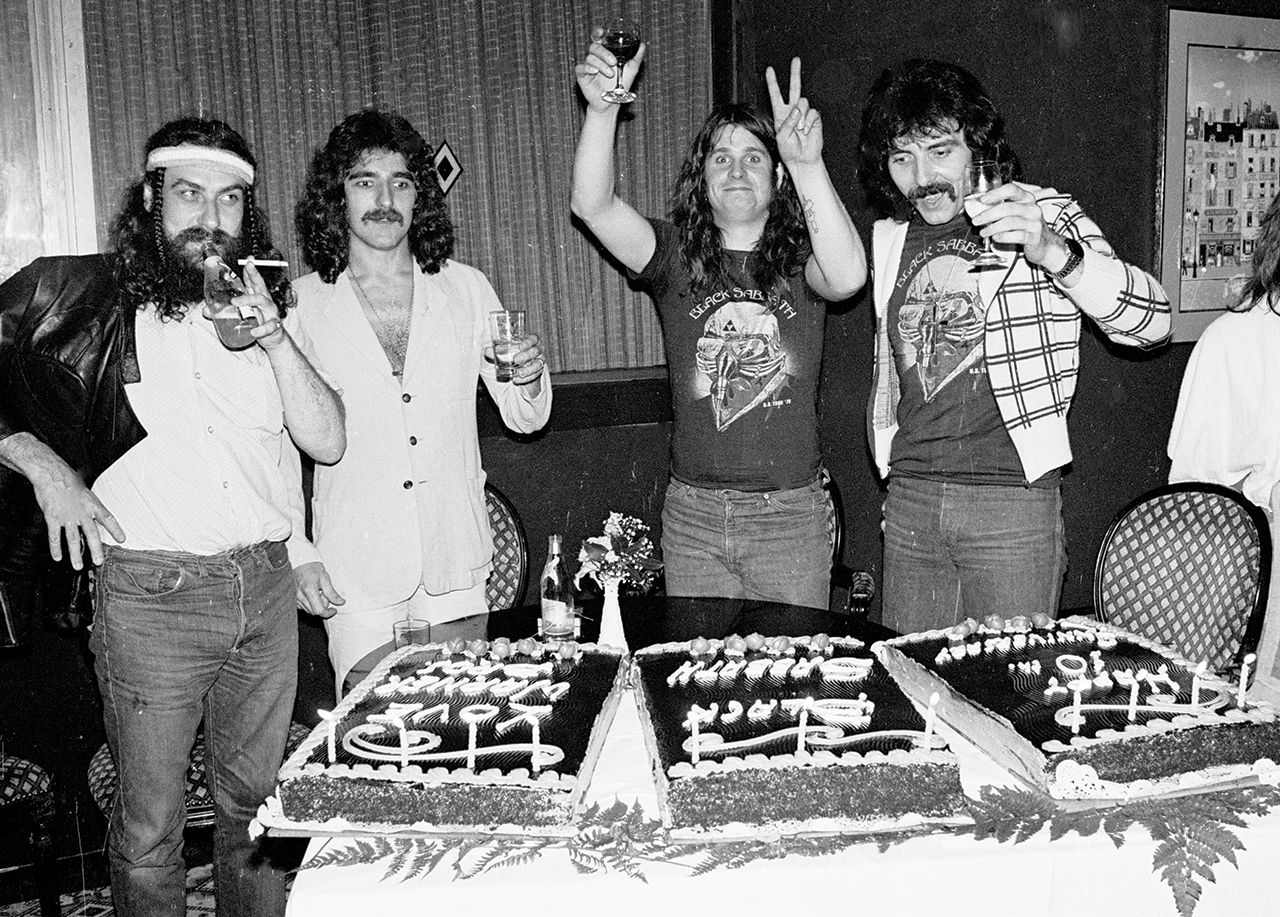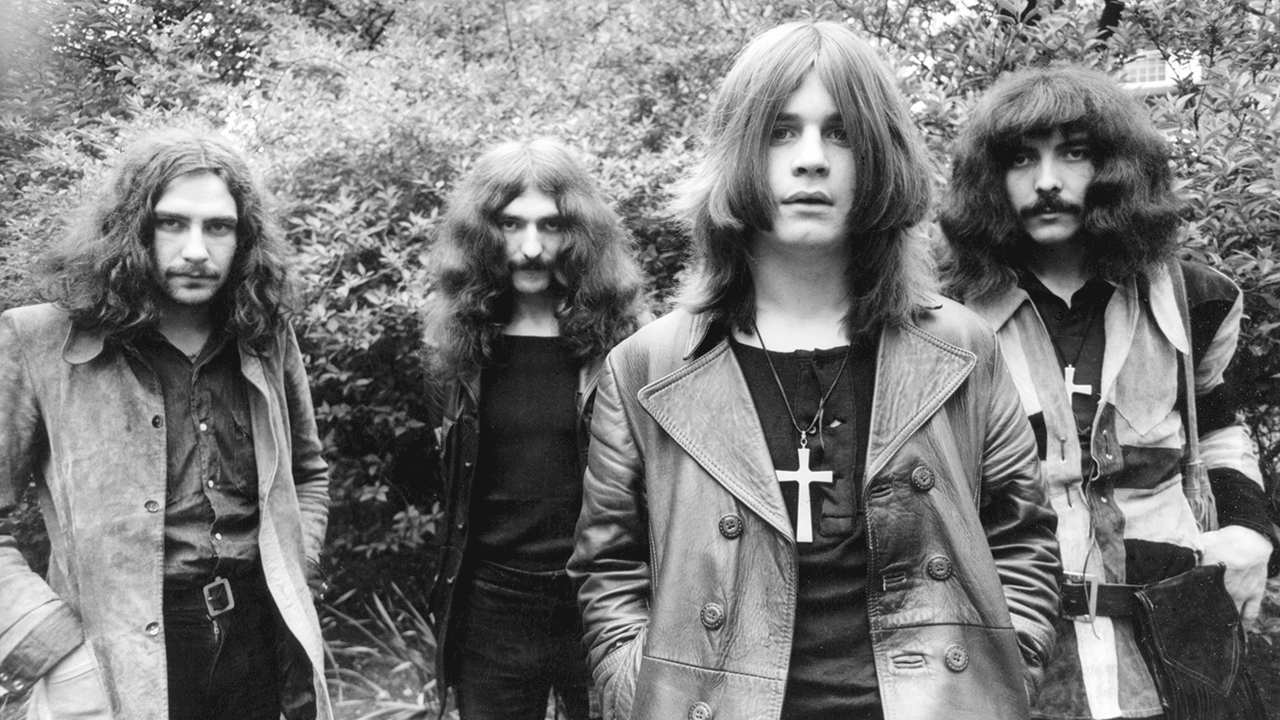While Black Sabbath’s imminent UK tour will see the metal godfathers bow out for good, it’ll be by no means the first time they’ve faced the end of the road. In fact, it was almost four decades ago that Sabbath found themselves in the most chaotic year of their entire career – one that began with drastic amends being made and yet, somehow, ended with Ozzy Osbourne, Tony Iommi, Geezer Butler and Bill Ward riding an out-of-control carousel that was threatening to hurl all four members into the abyss.
It began in January 1978. Mere months earlier, after a seven-year run of albums that had consolidated Sabbath as innovators of an entirely new kind of heavy, Ozzy had rashly decided to quit the band, attempting to put together his own solo outfit before having an equally sudden change of heart.
“It was only three days before we were due in the studio,” recalls Tony Iommi. “He contacted us and said he was keen to come back. We had all the songs written for [Ozzy’s replacement] Dave Walker, but agreed to let him back in. Maybe we should have been a little more ruthless and said no, but it was Ozzy, and we’d been through so much together. I just felt wrong not having him with us.”

While the reunion allowed Sabbath to try and move on with their career and continue their momentum, there were immediate problems.
“Ozzy couldn’t sing any of the songs we’d written,” continues Tony. “We had a nightmare, as the studio time was booked in Toronto. So, we had no choice: we scrapped the material, and went through the insane situation of writing a whole bunch of new songs. What we were doing was desperately writing in the morning, rehearsing in the afternoon and recording at night. Now, everyone can understand why it was such a mess. We had no time to think, so the album was all over the place. We were also smoking so much dope that we were high all the time. We’d go into the studio to try and get things done, but were too out of it. I’d be playing something different to Geezer Butler, and he sounded like he was on a different planet to Bill Ward. We had to abandon so many sessions because we were unable to concentrate.”

With alarm bells already jangling, it took the band five months to record the mess that would become Never Say Die!, and when it was released in September 1978, the reaction from fans and critics alike was less than favourable. To make matters even more difficult, on the subsequent tour, Sabbath were in bad shape. It was obvious something radical had to be done, or the band were going to fall apart.
“We were all doing lots of drugs in those days – everything you can think of,” recalls Tony. “And, because of this, the relationship between all of us was dreadful. The drugs took over. But Ozzy was the worst of all of us. He was on a different plane with his intake. Even by our crazy standards, he was outrageous.”
The tour was, to say the least, a huge disappointment. David Lee Roth, who was fronting support band Van Halen, later recalled how badly Sabbath were indulging their appetites for substances and alcohol.
“They would lock themselves away in their dressing room, and wouldn’t come out until they were ready to go onstage. It was clear to us they were a train wreck waiting to happen. They did treat us very well, and I remember that after the show in Birmingham, Ozzy invited us back to his house. He was so drunk, though, that he passed out on the floor. And his wife Thelma told his kids to ‘Kiss daddy goodnight’, even though he was unconscious! Man, that was bizarre!”
Sabbath filmed their show at Hammersmith Odeon on June 19, 1978, and if you can track down a copy of the show today, you’ll see everything you need to know about where the band were at that time. Here were four men clearly running on empty, with little rapport with the audience or even themselves. Nonetheless, the tour finished on December 11 in Albuquerque, and once it was over, the band rented a house in Los Angeles, converted the garage into a makeshift studio and set about trying to get songs together for the next album. Until, that is, Ozzy went missing.
- How Paranoid Made Black Sabbath Heavy Metal Superstars
- Ex Black Sabbath keyboardist Geoff Nicholls dies aged 68
- Ozzy: "With Black Sabbath Nothing Is Ever Easy. It’s Never Been Easy"
- The Black Sabbath Quiz: how well do you know The Ozzy Years?
“We didn’t see him for about six weeks,” recalls Tony. “He just had no interest in what we wanted to do. He was busy going to clubs and getting more off his face. I’m not saying that it was all his fault, because Geezer, Bill and I were all getting high as well. But his absence was a catalyst for our bad behaviour.
“What made it even worse was that I was the guy who had to go over regularly to see our record label [Warner, to whom Sabbath were signed in America]. They naturally wanted to know how things were coming along for the album. I was lying and telling them it was all fine, when the reality was we’d done nothing but take lots of drugs and get drunk. We would literally get together and end up abandoning all thoughts of getting some songs written, because Ozzy wasn’t around. I’m not blaming him for our lack of discipline, but it was obvious to the three of us that he longer cared about what happened to the band.”

By the time 1979 was rolling, it was clear that the wheels were coming off the Sabbath machine at an alarming rate, and something had to give.
“We knew that unless action was taken, then this band would just drift apart and split up,” remarks Tony. “There was no way we could carry on with a singer who was clearly not functioning. In the end, I brought up the thorny subject of making the jump and firing Ozzy. It was really down to doing this, or just agreeing the band were over. I know Ozzy always blamed me for this and says I pushed the others to agree, but what else could we do? Someone had to bring it all into the open, and it wasn’t as if Bill or Geezer disagreed. It was Bill who went to tell Ozzy, but that was because he volunteered to do it. He was probably closer to Ozzy than Geezer and I were, so it made sense. We never sent him, though, it was his idea!”
“I suppose I was like the janitor in that band,” recalls Bill of his daunting task. “I always seemed to get the shit jobs. But I thought I would be the best person to tell Ozzy what we had decided. So, yes, I did volunteer, nobody pushed me into it. But I have to say it was one of the worst things I have ever had to do in my life. I really didn’t want Ozzy to go, but what else could we do? However, for me it was the day the band imploded. I did wonder whether there was any way we could even think about going on.”
“I’d be lying if I said I didn’t feel betrayed by what happened with Black Sabbath,” remarked Ozzy years later in his autobiography, I Am Ozzy. “We were four blokes who’d grown up together a few streets apart. We were like family, like brothers. And firing me for being fucked-up was hypocritical bullshit. We were all fucked-up. If you’re stoned and I’m stoned and you’re telling me that I’m fired because I’m stoned, how can that be? Because I’m slightly more stoned than you are?”
Nonetheless, Ozzy was fired on April 27, 1979, and wouldn’t record again with the band until 2013 comeback album, 13. All these years later, Tony still remembers how the news of Ozzy’s departure was greeted at Sabbath’s label, Warner.
“They couldn’t believe it,” he remarks. “All they said was, ‘You can make a lot of money by staying together. Surely you can patch things up?’ They didn’t get how bad things were. All that mattered to them was the money – typical! That was also one of our problems. We had nobody we could turn to to try and sort this out. If there had been someone on the business side who we could trust, then maybe they would have been able to sit Ozzy down and get him back on track. But without that, we were left to our own devices, and that was bad news. Honestly, we weren’t in a fit state to make rational decisions. But those around us were just thinking of the money they were gonna make from Black Sabbath continuing, not what was best for us as human beings.”
The rest, as they say, is history. Ronnie James Dio would enter the Sabbath fold for an extremely fruitful period that included 1980 classic Heaven And Hell, before a decade of the singer equivalent of musical chairs saw a host of names come through the ranks. A couple of high-profile, original lineup reunions across the years eventually paved the way for that aforementioned 13 album, which – despite the controversial absence of Bill Ward – landed to critical acclaim. Today, while there’s still no immediate sign of Bill returning to the band for their final farewell, they’ve managed to firmly reclaim their metal throne – a process which Tony insists would have never happened if they’d allowed the madness of ’78-’79 to continue into Sabbath’s next decade.
“If we had stuck with Ozzy back then, I have no doubt one or more of us would have died,” he insists. “We were all out of control and it would definitely have gotten worse. So, we did the band, and Ozzy, a favour. At the time, it didn’t seem like that; we were all scared of what we’d do next. But looking back now, it was such a huge relief for us. I’m not proud of that period in Sabbath’s history, but we had to plummet to such a low in order to rise back up.”
All Kinds Of Crazy: Life On The Road With Black Sabbath In The 1970s
Rob Halford looks back on Black Sabbath's Heaven And Hell
Why Black Sabbath's Paranoid is the Quintessential Heavy Metal Album

